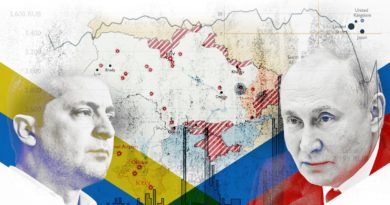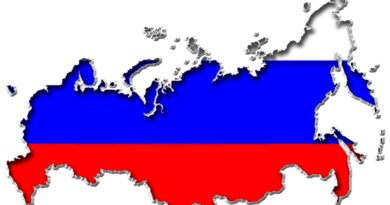Ukraine: Is the Hammer About to Fall?
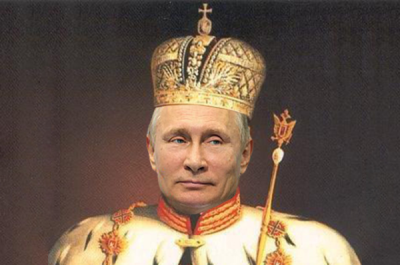
“Here’s something you must understand. We were not given any opportunity to act differently.” — Vladimir Putin
The plan to engage Russia militarily is a tacit admission that the United States can no longer maintain its global dominance through economic or political means alone. After exhaustive analysis and debate, western elites have settled on a course of action aimed at dividing the world into warring blocs in order to prosecute a war on Russia and China. The ultimate strategic objective of the current policy, is to tighten the grip of western elites on the levers of global power and to prevent the dissolution of the “rules-based international order.” But after 11 months of nonstop warfare in Ukraine, the US-backed western coalition finds itself in a worse position than when it began.
Aside from the fact that the economic sanctions have severely impacted Washington’s closest European allies, the West’s control of Ukraine has plunged the economy into a protracted slump, destroyed much of the country’s critical infrastructure and annihilated a sizable portion of the Ukrainian Army. More importantly, Ukrainian forces are now suffering unsustainable casualties on the battlefield which is laying the groundwork for the inevitable splintering of the state. Whatever the outcome of the conflict may be, one thing is certain: Ukraine will no longer exist as a viable, independent, contiguous state.
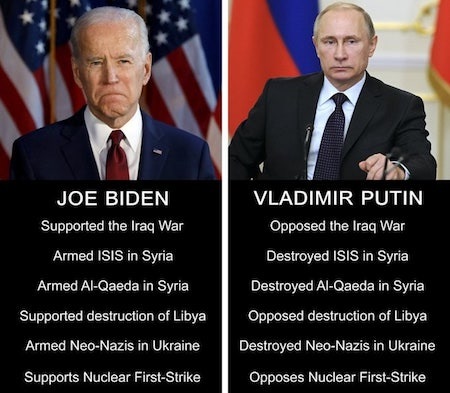
One of the biggest surprises of the current war, is simply the lack of preparedness on part of the US. One would assume that if the foreign policy mandarins decided to “lock horns” with the world’s biggest nuclear superpower, they would have done the necessary planning and preparation to ensure success. Clearly, that hasn’t happened. US policymakers seem surprised by the fact that the economic sanctions backfired and actually strengthened Russia’s economic situation. They also failed to anticipate that the vast majority of countries would not only ignore the sanctions but proactively explore options for “ditching the dollar” in their business transactions and in the sale of critical resources.
We see the same incompetence in the provision of lethal weapons to Ukraine. How do we explain the fact that the NATO nations have been frantically scraping the bottom of the barrel to find weapons for Ukraine? Did our leaders really start a war with Russia not knowing whether they had sufficient supplies of weapons and ammo to fight the enemy? That appears to be the case.
And were our leaders so sure that the conflict would be a low-intensity insurgency that they never planned for a full-blown, combined-arms, ground war? Once again, this appears to be true.
These aren’t trivial mistakes. The level of incompetence in the planning of this war is beyond anything we’ve ever seen before. It appears that all the preparation was focused on provoking a Russian invasion, not on the developments that would happen soon afterwards. What’s clear, is that the Pentagon never “gamed out” the actual war itself or the conflict as it is presently unfolding. Otherwise, how does one explain these glaring errors in judgement:
- They never thought the sanctions would backfire
- They never thought they’d run out of weapons and ammo
- They never thought Russia’s oil receipts would skyrocket
- They never thought that the majority of countries would maintain normal relations with Russia
- They never figured they’d actually need a coherent military strategy for fighting a ground war in eastern Europe.
Is there anything they got right?
Not that we can see.
Take a look at this excerpt from an interview with ex-Brigade General Erich Vad who served as Angela Merkel’s policy advisor from 2006 to 2013:
Question– You too have been attacked for calling for negotiations.
Brigade General Erich Vad–Yes, as did the Inspector General of the German Armed Forces, General Eberhard Zorn, who, like me, warned against overestimating the Ukrainians’ regionally limited offensives in the summer months. Military experts – who know what’s going on among the secret services, what it’s like on the ground and what war really means – are largely excluded from the discourse. They don’t fit in with media opinion-forming. We are largely experiencing a media synchronization that I have never experienced in the Federal Republic…
Military operations must always be coupled with attempts to bring about political solutions. The one-dimensionality of current foreign policy is hard to bear. She is very heavily focused on weapons. The main task of foreign policy is and remains diplomacy, reconciliation of interests, understanding and conflict management. I miss that here. I’m glad that we finally have a foreign minister in Germany, but it’s not enough to just use war rhetoric and walk around in Kyiv or Donbass with a helmet and flak jacket. This is too little….
Brigade General Erich Vad–Then the question arises again as to what should happen with the deliveries of the tanks at all. To take over the Crimea or the Donbass, the martens and leopards are not enough. In eastern Ukraine, in the Bakhmut area, the Russians are clearly advancing. They will probably have completely conquered the Donbass before long. One only has to consider the numerical superiority of the Russians over Ukraine. Russia can mobilize up to two million reservists. The West can send 100 martens and 100 leopards there, they don’t change anything in the overall military situation. And the all-important question is how to end such a conflict with a warlike nuclear power – mind you, the most powerful nuclear power in the world! – wants to survive without going into a third world war….
You can continue to wear down the Russians, which means hundreds of thousands of deaths, but on both sides. And it means further destruction of Ukraine. What is left of this country? It will be leveled to the ground. Ultimately, that is no longer an option for Ukraine either. The key to solving the conflict does not lie in Kyiv, nor does it lie in Berlin, Brussels or Paris, it lies in Washington and Moscow…. A broader front for peace must be built in Washington…. Otherwise we wake up one morning and we’re in the middle of World War III.” (“Erich Vad: “What are the War Aims”, Emma)
Let’s summarize:
- The media is “overestimating the (effect of) Ukrainians’ regionally limited offensives”. In short, the Ukrainians are losing the war.
- The Russians are winning the war. (“The Russians are clearly advancing. They will probably have completely conquered the Donbass before long.”)
- Weapons alone will not change the outcome of the war. (“the martens and leopards are not enough.”)
- There is no evidence that the west has clearly defined strategic objectives. (“Do you want to achieve a willingness to negotiate with the deliveries of the tanks? Do you want to reconquer Donbas or Crimea? Or do you want to defeat Russia completely? There is no realistic end state definition. And without an overall political and strategic concept, arms deliveries are pure militarism…Military operations must always be coupled with attempts to bring about political solutions.”)
This is not just an indictment of the way the war is being conducted, but of the strategic objectives which remain murky and poorly-defined. NATO is being led around by the nose by Washington, but Washington has no idea what it wants to achieve. “Weakening Russia” is not a coherent military strategy. It is, in fact, an aspirational phantasm nurtured by hawkish neocons playing armchair generals. But that is why we are in the predicament we are today, because the policy is in the hands of deranged fantasists. Does anyone seriously believe that the Ukrainian army will recover the territories in east Ukraine that have been annexed by Russia?
No, no serious person believes that. And, yet, the illusion that the “plucky Ukrainians are winning” persists, even while the casualties mount, the carnage increases and millions of Ukrainians flee the country. It’s beyond belief.
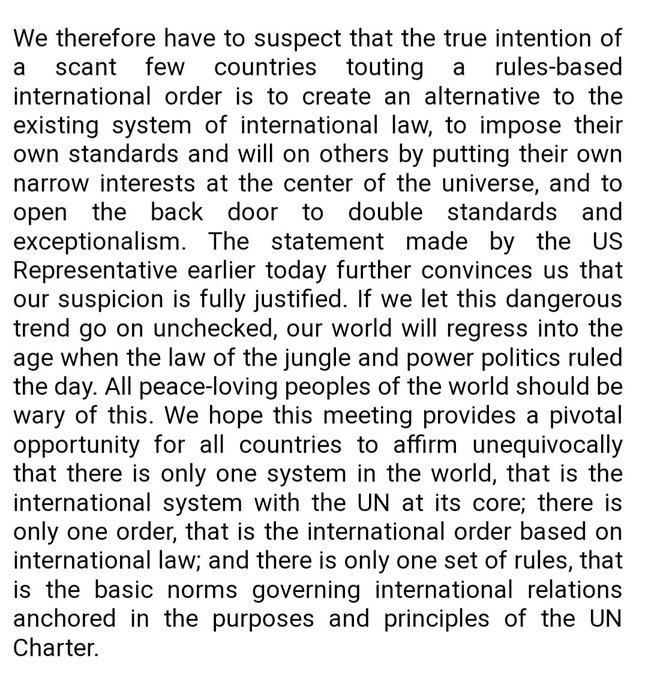
At the United Nations—China’s critique of Washington’s “rules-based international order”, which is designed to circumvent international law through violent unilateralism
Remember the Powell Doctrine? “The Powell Doctrine states that a list of questions all have to be answered affirmatively before military action is taken by the United States:
- Is a vital national security interest threatened?
- Do we have a clear attainable objective?
- Have the risks and costs been fully and frankly analyzed?
- Have all other non-violent policy means been fully exhausted?
- Is there a plausible exit strategy to avoid endless entanglement?
- Have the consequences of our action been fully considered?
- Is the action supported by the American people?
- Do we have genuine broad international support?
The former Secretary of Defense Colin Powell developed his Doctrine to avoid any future Vietnams. And while the Biden administration has not yet committed US combat troops to Ukraine, we think it’s only a matter of time. After all, the media is already beating the war drums while demonizing all-things Russia. That is traditionally how they prepare the public for war. (“Russophobia … is all about dehumanizing one’s opponents to make killing more acceptable (and destroying) all the mental restraints that keep men from barbarism.” Gilbert Doctorow)
Meanwhile, the US continues to pump Ukraine full of weapons while the Pentagon has begun training Ukrainian servicemen in Germany and Oklahoma. It looks like the decision has already been made to embroil the US in another conflict for which there is no vital national security interest and no clear path to victory. In other words, the Powell Doctrine has been shrugged off and replaced with another lunatic neocon plan aimed at dragging Russia into a bloody “Afghanistan-type” quagmire that will drain its resources and prevent it from blocking US expansion into Central Asia.
And how is the neocon plan working so far?
Here’s what Colonel Douglas MacGregor said in a recent interview:
“There are now 540,000 Russian troops stationed around the outskirts of Ukraine preparing to launch a major offensive that I think will probably end the war in Ukraine.540,000 Russian troops, 1,000 rocket artillery systems, 5000 armored fighting vehicles including at least 1,5000 tanks, hundreds and hundreds of tactical ballistic missiles. Ukraine is now going to experience war on a scale we haven’t seen since 1945.”
And if that wasn’t bleak enough, here’s more from a recent video with Alexander Mercouris and Alex Christoforou:
Alex Christoforou–“There is just a general panic that is gripping the Ukrainian military, NATO and the west. … The Russians have been masterful in concealing their fighting forces …so you have 500,000 thousand military (combat troops) waiting in the wings which leaves Ukraine wondering, “What do we do? We’re bogged down in this Bakhmut-Soledar area when these 500,000 Russian troops could be planning to hit us from any direction and we have no idea where the attack is going to come from?
Alexander Mercouris–“You are exactly right. The Russians have completely gained the strategic initiative. They’re keeping everyone guessing, and to increase the sense of panic in Kiev even more, a Russian general Sulukov has just visited the Russian grouping in Belarus which is growing in size all the time… Does that mean the Russians are planning to advance south from Belarus? We don’t actually know…. But there is this enormous buildup taking place on every front on an order of magnitude greater than anything we’ve seen before. Not just hundreds of thousands of troops deployed, but hundreds of tanks…infantry fighting vehicles, ammunition, artillery pieces…and it’s building up on an enormous scale ….and the fighting in Donbass in the last couple of weeks has been the work of two bodies that are not part of the regular Russian army (The Wagner Group and the Donbas Militia) The main force of the Russian army which has been building up in extraordinary numbers, has not yet been committed to the battle to any great extent. So, I think everybody is expecting that some big blow is coming. No one knows for sure where it will happen. I don’t know (but) the Russians have managed again to keep it all extraordinarily secret. … No one knows what they are going to do, but what we can see is these vast numbers of forces gathering around Ukraine where they Ukrainians are obviously panicking (because it looks like something is going to hit on a huge scale (but) I don’t know where it will come from.” (“Russia’s next move, keeps collective west guessing”, Alex Christoforou and Alexander Mercouris, You Tube, 15:25 minute)
[embedded content]
Bottom line: While Washington and its NATO allies do not have a coherent strategy for winning the war in Ukraine, it’s clear, the Russians do. In the four months since Putin ordered his partial mobilization, 300,000 additional reservists have joined their units on the battlefield or along Ukraine’s northern perimeter. The stage is now set for a conventional ground war the likes of which no one in Washington ever anticipated. We expect that the outcome of this conflict will reshape Europe’s outdated security architecture and force a realignment that will mark the end of the unipolar era.
*
Note to readers: Please click the share buttons above. Follow us on Instagram and Twitter and subscribe to our Telegram Channel. Feel free to repost and share widely Global Research articles.
This article was originally published on The Unz Review.
Michael Whitney is a renowned geopolitical and social analyst based in Washington State. He initiated his career as an independent citizen-journalist in 2002 with a commitment to honest journalism, social justice and World peace.
He is a Research Associate of the Centre for Research on Globalization (CRG).
All images in this article are from TUR

